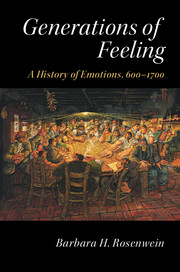Book contents
- Frontmatter
- Dedication
- Epigraph
- Contents
- List of plates
- List of figures
- List of maps and genealogies
- List of tables
- Prefatory note
- Acknowledgments
- List of abbreviations
- Introduction
- 1 Ancient theories
- 2 Attachment and detachment
- 3 Alcuin's therapy
- 4 Love and treachery
- 5 Thomas’ passions
- 6 Theatricality and sobriety
- 7 Gerson's music
- 8 Despair and happiness
- 9 Hobbes’ motions
- Conclusion
- Bibliography
- Index
1 - Ancient theories
Published online by Cambridge University Press: 05 November 2015
- Frontmatter
- Dedication
- Epigraph
- Contents
- List of plates
- List of figures
- List of maps and genealogies
- List of tables
- Prefatory note
- Acknowledgments
- List of abbreviations
- Introduction
- 1 Ancient theories
- 2 Attachment and detachment
- 3 Alcuin's therapy
- 4 Love and treachery
- 5 Thomas’ passions
- 6 Theatricality and sobriety
- 7 Gerson's music
- 8 Despair and happiness
- 9 Hobbes’ motions
- Conclusion
- Bibliography
- Index
Summary
We begin with Cicero (d. 43 BCE). To be sure, long before his time many theories of the emotions had been elaborated, particularly within the Stoic and Epicurean philosophies of the Hellenistic era. Cicero drew on these traditions when he wrote on emotions for the Latinate audience of the Roman West. Medieval people inherited his writings. But they read them through Christian lenses. Christianity, which became the official religion of the Roman Empire in the 380s, radically transformed ancient ideas about the emotions. To get a clear idea of some of the most important of those changes, we will focus in the second part of this chapter on Saint Augustine's reconsideration of the Ciceronian canon. Augustine (d. 430), perhaps the most influential of the Western Church Fathers, read Cicero on the emotions and reoriented the discussion. Armed with the theories and the vocabularies of Augustine and Cicero, we will be ready to look at some early medieval emotional communities in Chapter 2. In addition, the writings of Cicero and Augustine discussed here exerted an enormous influence on later emotional communities, especially those of the twelfth century and beyond, as we shall see in Chapter 4 and those thereafter.
Cicero's somber, “Stoic” emotions
While Cicero expressed many emotions in his writings, we are here interested in his theoretical works on the topic, particularly the Tusculan Disputations and Laelius on Friendship. Both were written near the end of Cicero's life, the first in 45 and the second in 44 bce. This was a period of crisis for Cicero. Caesar was ready to end the Republic, and Cicero no longer had a role in the state, as he longed to have. Further, his beloved daughter had recently died. Retiring to his estate at Tusculum, just southeast of Rome, he intended the writing of his Disputations to be a kind of therapy. In the course of his wide-ranging discussion, he offered what amounted to a summary of Stoic theory (which had been elaborated in the course of the third and second centuries) and a list in Latin of the perturbationes animi that were equivalent to the Stoic pathé, or “emotions.” The Stoics intended to achieve apatheia, freedom from the effects of the pathé. Cicero wanted to demonstrate his “strength of mind” in the face of emotional turmoil.
- Type
- Chapter
- Information
- Generations of FeelingA History of Emotions, 600–1700, pp. 16 - 34Publisher: Cambridge University PressPrint publication year: 2015



